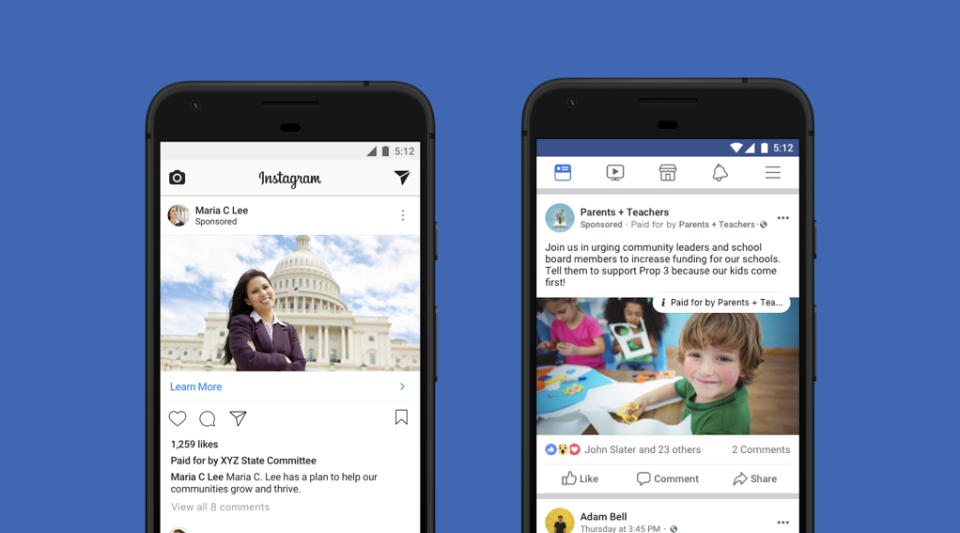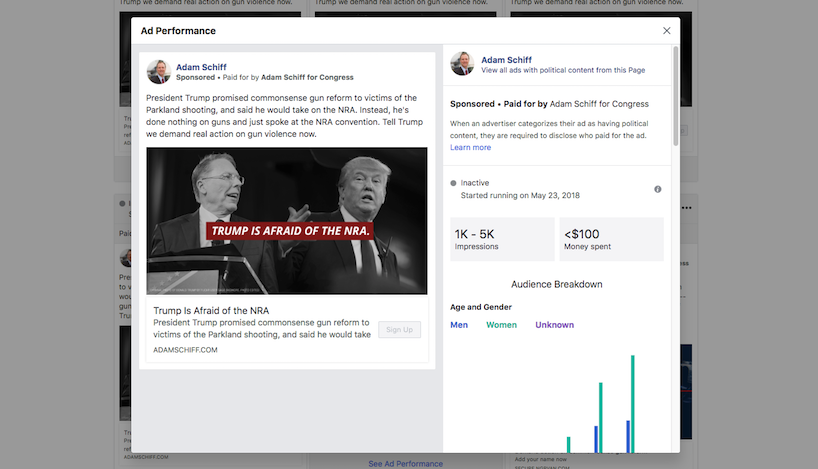 APPS
APPS
 APPS
APPS
 APPS
APPS
Facebook Inc. today announced several steps to reduce the proliferation of propaganda on the platform, following months of controversy surrounding Russian meddling in the U.S. election and stirring up discord in the country.
As of today, anything that appears on Facebook as an ad must be marked as such with the words “Paid for by” and the name of the advertiser. Facebook said that this is “is especially important when the Page name doesn’t match the name of the company or person funding the ad.”
Users can then click on that label and they will be taken to an archive with more information, including ad campaign information and how much has been spent on that campaign. Facebook will also tell users who has seen the ad in terms of age, location and gender.
That archive can be reached by anyone at facebook.com/politicalcontentads as well. Those visiting the archive can see and search for ads with political or issue content up to seven years back. Entities in the U.S. that want to run sponsored political ads will have to verify their identity and location.
“We think ads should be transparent,” Steve Satterfield, Facebook’s director of public policy, said today on a call with the press. “You should be able to understand who’s showing you ads.”
Rob Leathern, a Facebook director of product management, said in a blog post that Facebook expects this greater transparency will lead to “increased accountability and responsibility over time — not just for Facebook but advertisers as well.”
Leathern added that if users do see political ads that haven’t been labeled, they have the option to report it by clicking on the three dots at the top of the ad and clicking “report.” Then users have the option to say whether it relates to a certain issue or a political candidate. If it turns out there has been abuse, that advertiser will lose the right to run political ads.

In addition, the company is working with its news partners to update the archive to help people differentiate between news and other content — an issue of particular concern to news organizations worried that political or issue stories they promote via Facebook ads might be labeled as propaganda. Judging from comments on the press call, that is far from a finished process and will require ongoing assessment and changes, especially in terms of how well the machine learning filters will work and how human moderators will be involved.
“We will have to work with outside parties and researchers to grow our understanding of these ads,” Leathern said. Feedback on the archive will be key to that, he said, but he added that the process will continue to be a game of “cat and mouse” with advertisers that may try to take advantage of the many gray areas.
“These changes will not prevent abuse entirely,” said Leathern. “We’re up against smart, creative and well-funded adversaries who change their tactics as and when we spot abuse. But we believe that they will help prevent future interference in elections on Facebook.”
Facebook is also providing an application programming interface for researchers to get a better sense of advertisers and ads. When asked how granular that API would be in terms of information provided, and how Facebook would avoid problems of advertisers or other players using the API for nefarious purposes, like Cambridge Analytica, Satterfield replied that Facebook is still “figuring that out.”
Facebook also reiterated what we already know from previous updates: An army of some 20,000 moderators will be hired to weed out the bad actors, apparently costing the company hundreds of millions, but Facebook said today that 3,000 to 4,000 of those moderators will be assigned to ad transparency efforts by the end of the year. A team of experts, academics and researchers will also be on board.
In devising the policy, the company said, it had to contend with arguments that getting rid of the political ads was the only way to solve the problem versus contentions that banning these ads would favor incumbents and candidates with deep pockets. Ultimately, Satterfield and Katie Harbath, global politics and outreach director, said in a post, Facebook decided the benefits of running the ads outweighed the downsides.
The key, they said, is transparency, thus these new rules. But even then, deciding what’s a political ad is very tricky, they said. In conjunction with the nonpartisan Comparative Agendas Project, Facebook came up with a list of 20 initial issues such as abortion, civil rights, environment, immigration and foreign policy. Even then, however, Facebook said its policy would apply only to ads “trying to achieve a political purpose” in those topic areas.
The enforcement process will include checking images and text in the ad and who’s being targeted, as well as landing pages if people are sent elsewhere. The ads will be automatically blocked from running if the advertiser hasn’t been authorized. They said the policy will develop over time along with changing public issues, and the company is joining with the research firm YouGov to help identify those changes.
In coming months, Facebook said, it will expand the new ad transparency features to other countries and work with international partners, such as election regulators in other countries, to determine what issues to include for each country.
With reporting from Robert Hof
Support our mission to keep content open and free by engaging with theCUBE community. Join theCUBE’s Alumni Trust Network, where technology leaders connect, share intelligence and create opportunities.
Founded by tech visionaries John Furrier and Dave Vellante, SiliconANGLE Media has built a dynamic ecosystem of industry-leading digital media brands that reach 15+ million elite tech professionals. Our new proprietary theCUBE AI Video Cloud is breaking ground in audience interaction, leveraging theCUBEai.com neural network to help technology companies make data-driven decisions and stay at the forefront of industry conversations.